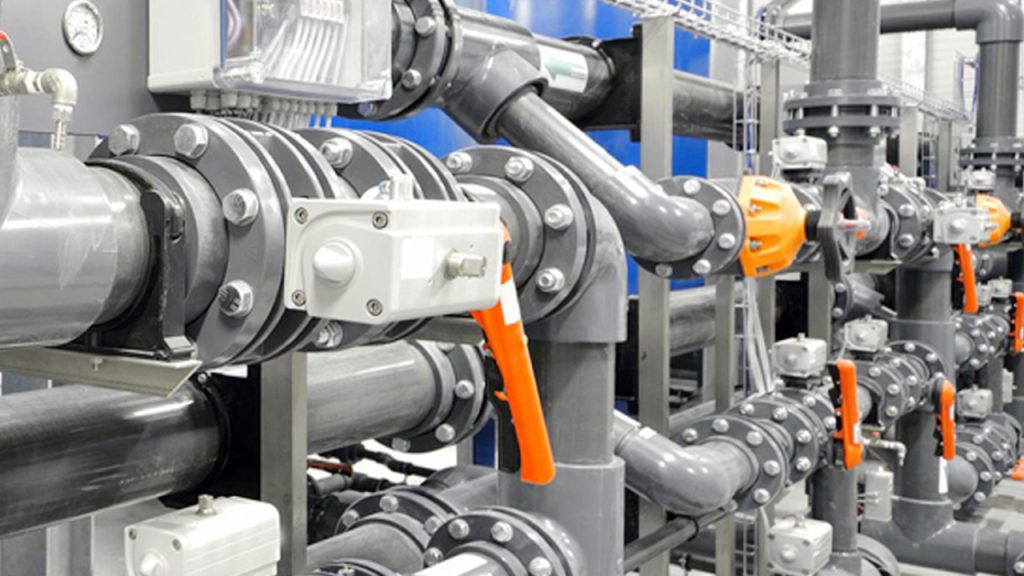What Is Commercial Plumbing? Expert Insights into Its Role and Benefits
Commercial plumbing plays a vital role in ensuring the smooth operation of businesses and commercial establishments. From office buildings to hotels, restaurants, and retail stores, commercial plumbing systems are designed to handle high volumes of water usage and heavy-duty appliances. Unlike residential plumbing, commercial plumbing requires specialized skills and expertise to handle the complex network of pipes, fixtures, and drainage systems.

Photo by dunnriteplumbing.ca
In a commercial setting, plumbing issues can have far-reaching consequences, causing disruptions to everyday operations, productivity losses, and even health and safety hazards for employees and customers. Commercial plumbers are trained professionals who understand the intricacies of these systems and are equipped to handle various challenges, including leak detection, pipe repairs, drain cleaning, and water heater installations.
Importance of Commercial Plumbing
Commercial plumbing is essential for the proper functioning of businesses and commercial establishments. The efficient operation of plumbing systems is crucial for maintaining a safe and comfortable environment for employees and customers. A well-maintained commercial plumbing system can prevent costly downtime, increase productivity, and even attract more customers.
One of the primary reasons why commercial plumbing is important is its ability to handle the high volume of water usage in commercial settings. Unlike residential plumbing systems, which are designed for a limited number of occupants, commercial plumbing systems must accommodate the needs of many people. This includes providing sufficient water supply for various purposes, such as drinking, washing, and sanitation.
Commercial establishments often have heavy-duty appliances that require specialized plumbing connections. This includes commercial-grade dishwashers, washing machines, and water heaters.
A professional commercial plumber understands the specific requirements of these appliances and can ensure they are installed and maintained correctly.
Don’t miss out on related tips: Read this next: What Are Water Treatment Plants?
Types of Commercial Plumbing Services
Commercial plumbers offer a wide range of services to meet the unique needs of businesses and commercial establishments. These services go beyond basic plumbing repairs and include specialized solutions for complex plumbing systems. Here are some common types of commercial plumbing services:
Installation and Upgrades
Commercial plumbers are responsible for installing and upgrading plumbing systems in new and existing commercial buildings. This includes designing the layout of pipes, fixtures, and drainage systems to ensure efficient water flow and waste removal.
Repair and Maintenance
Commercial plumbers handle various repair and maintenance tasks, including fixing leaks, unclogging drains, repairing faulty fixtures, and replacing damaged pipes. Regular maintenance is crucial for preventing major plumbing issues and minimizing disruptions to daily operations.
Backflow Prevention
Backflow is the reverse flow of water from a contaminated source back into the clean water supply. Commercial plumbers install and maintain backflow prevention devices to ensure the safety and integrity of the water supply in commercial establishments.
Water Heater Services
Commercial establishments often require larger and more powerful water heaters than residential properties. Commercial plumbers are skilled in installing, repairing, and maintaining commercial-grade water heaters to ensure a constant supply of hot water.
Common Commercial Plumbing Issues
Commercial plumbing systems are prone to various issues due to the high volume of usage and complex network of pipes. Understanding these common issues can help businesses identify and address plumbing problems promptly. Here are some of the most common commercial plumbing issues:
Leaking Pipes
Leaks are a common problem in commercial plumbing systems. They can occur due to aging pipes, corrosion, high water pressure, or improper installation. Leaks not only waste water but can also cause water damage to the building structure and lead to mold growth.
Clogged Drains
Commercial establishments often experience clogged drains due to the accumulation of debris, food waste, grease, or other foreign objects. Clogged drains can cause water backups, unpleasant odors, and even damage to the plumbing system.
Sewer Line Issues
Problems with the sewer line can lead to sewage backups, foul odors, and potential health hazards. Sewer line issues can occur due to tree root intrusion, pipe deterioration, or blockages caused by debris or grease buildup.
Water Heater Failures
Commercial water heaters are subjected to heavy usage and constant demand for hot water. Over time, they can develop issues such as sediment buildup, faulty thermostats, or heating element failures.
Components of a Commercial Plumbing System
A commercial plumbing system consists of several key components that work together to ensure the efficient flow of water and waste removal. Understanding these components can help businesses better understand their plumbing systems and communicate effectively with commercial plumbers. Here are the key components of a commercial plumbing system:
Water Supply Lines
Water supply lines bring clean, treated water into the building from the main water source. These lines are typically made of copper, galvanized steel, or plastic pipes and are connected to fixtures such as sinks, toilets, and water heaters.
Drainage System
The drainage system is responsible for removing wastewater from the building and directing it to the sewer or septic system. It includes pipes, traps, vents, and other fixtures that ensure the proper flow of wastewater without causing backups or foul odors.
Fixtures
Fixtures are the visible components of a plumbing system, including sinks, toilets, showers, and faucets. Commercial establishments often have multiple fixtures in different areas, each requiring proper installation and maintenance.
Backflow Prevention Devices
Backflow prevention devices are installed to prevent the backward flow of contaminated water into the clean water supply. These devices are crucial for maintaining the integrity and safety of the water supply in commercial settings.
Commercial Plumbing Regulations and Codes
Commercial plumbing systems must adhere to specific regulations and codes to ensure safety and compliance. These regulations vary depending on the location and type of establishment. Commercial plumbers are familiar with these regulations and can ensure that the plumbing system meets all necessary requirements. Here are some common regulations and codes that govern commercial plumbing:
Building Codes
Building codes outline the minimum requirements for plumbing systems in commercial buildings. They cover aspects such as pipe sizing, fixture installation, venting, and drainage design.
Health and Safety Regulations
Health and safety regulations are in place to protect the well-being of employees and customers. These regulations may include requirements for proper sanitation, backflow prevention, and accessibility for individuals with disabilities.
Environmental Regulations
Commercial plumbing systems must comply with environmental regulations to prevent pollution and protect natural resources. This may include regulations related to wastewater treatment, water conservation, and the use of environmentally friendly plumbing materials.
Hiring a Commercial Plumber
When it comes to commercial plumbing, it is crucial to hire a professional and experienced commercial plumber. Here are some factors to consider when hiring a commercial plumber:
Qualifications and Experience
Look for a commercial plumber who is licensed, insured, and has relevant experience in handling commercial plumbing systems. A reputable plumber should be able to provide references and demonstrate their expertise in commercial plumbing.
24/7 Emergency Services
Plumbing emergencies can occur at any time, and they can significantly impact business operations. Choose a commercial plumber who offers 24/7 emergency services to ensure prompt response and resolution of plumbing issues.
Reputation and Reviews
Research the reputation of the commercial plumber by reading online reviews and testimonials from previous clients. A positive reputation and satisfied customers are indicators of a reliable and trustworthy plumber.
Cost and Transparency
Obtain multiple quotes from different commercial plumbers and compare their pricing. Ensure that the plumber provides a detailed breakdown of the costs and is transparent about any additional charges or fees.
Maintenance and Service Contracts
Consider choosing a commercial plumber who offers maintenance and service contracts. These contracts can help businesses stay on top of regular plumbing maintenance and prevent major issues from arising.
Commercial Plumbing Maintenance Tips
Regular maintenance is crucial for the longevity and efficient functioning of a commercial plumbing system. Here are some maintenance tips to keep in mind:
Schedule Routine Inspections: Regularly inspect the plumbing system for leaks, corrosion, or any signs of damage. Early detection can prevent minor issues from turning into major problems.
Address Leaks Promptly: Don’t ignore even the smallest leaks. Promptly repair any leaks to prevent water damage and wastage. Leaks can also indicate underlying plumbing issues that need attention.
Clean Drains Regularly: Keep drains clear of debris, food waste, and grease by regularly cleaning them. Avoid pouring harmful chemicals down the drains as they can damage the plumbing system.
Educate Employees: Train employees on proper water usage and how to report plumbing issues. Encourage them to notify management or maintenance staff if they notice any leaks, clogs, or other plumbing problems.
Winterize the Plumbing System: In colder climates, take necessary precautions to protect the plumbing system from freezing temperatures. This includes insulating pipes, shutting off outdoor water sources, and maintaining indoor temperatures.
Benefits of Regular Commercial Plumbing Inspections
Regular inspections by a professional commercial plumber can provide numerous benefits for businesses. Here are some advantages of scheduling regular commercial plumbing inspections:
Early Problem Detection
Regular inspections can help identify plumbing issues in their early stages before they escalate into major problems. This can save businesses from costly repairs and extensive downtime.
Improved Efficiency
A well-maintained commercial plumbing system operates more efficiently, resulting in reduced water consumption and lower utility bills. Inspections can identify areas where improvements can be made to optimize efficiency.
Extended Lifespan of Plumbing System
Regular maintenance and inspections can extend the lifespan of the plumbing system. By addressing minor issues promptly and ensuring proper upkeep, businesses can avoid premature system failures and replacements.
Compliance with Regulations
Regular inspections ensure that the plumbing system remains compliant with applicable regulations and codes. This helps businesses avoid penalties and legal issues.
Peace of Mind
Knowing that the plumbing system is regularly inspected and maintained provides peace of mind for business owners and managers. It allows them to focus on their core operations without worrying about unexpected plumbing problems.
Conclusion
Commercial plumbing is a crucial aspect of maintaining the efficient operation of businesses and commercial establishments. From handling high volumes of water usage to specialized appliances, commercial plumbing systems require the expertise of trained professionals.
By investing in regular maintenance, promptly addressing plumbing issues, and partnering with experienced commercial plumbers, businesses can ensure the longevity and efficient functioning of their plumbing systems. Prioritizing commercial plumbing not only saves on repair costs but also provides a safe and comfortable environment for employees and customers alike.



